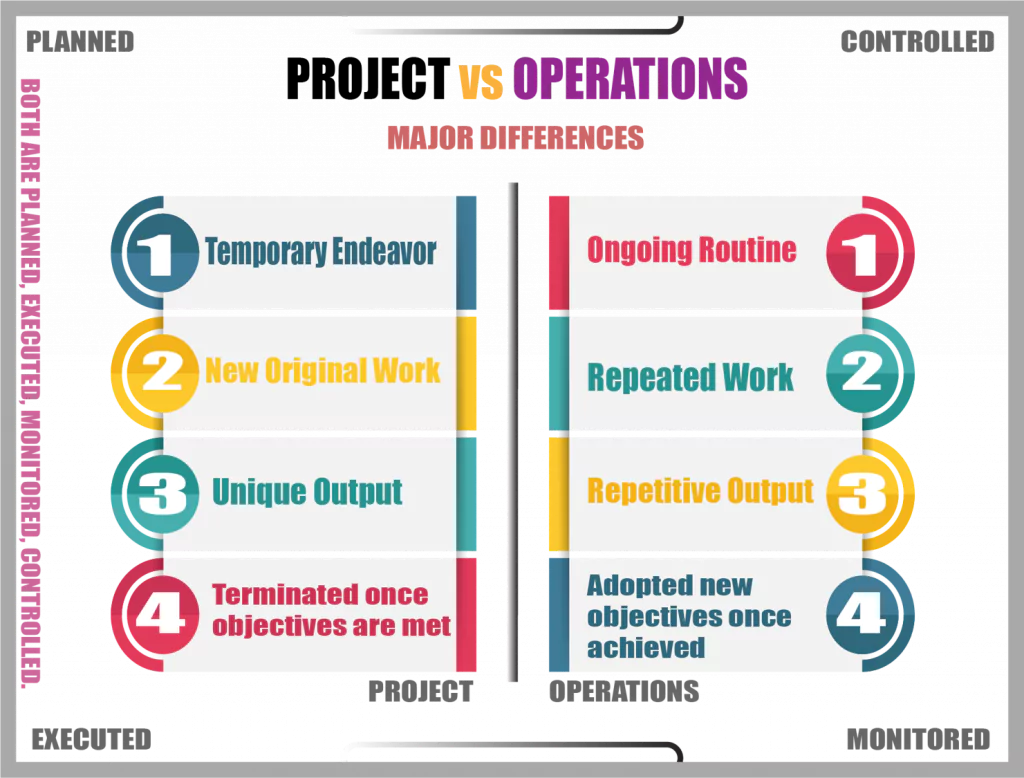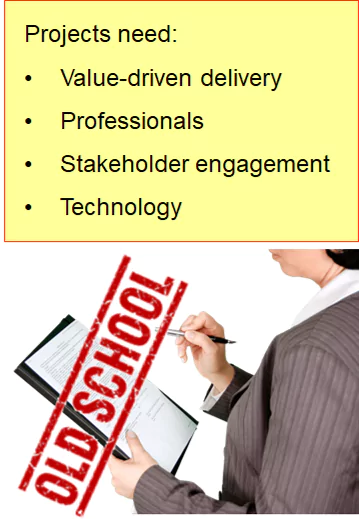Managers usually don’t buy project management. They approve projects but don’t assign anyone to oversee the big picture, anticipate problems, make forecasts, be accountable, and ultimately, take responsibility for achieving success. They see that the project team self-manages through meetings, which they sometimes attend for information and other times to address issues on the fly.
If nobody is managing the project, no wonder it finishes with cost overruns, delays, and failing to meet the business objectives. A project professional would know how to do it better, but since we have a reputation as bureaucrats (documents, processes, workflows, and more meetings), they prefer crises, that is, reacting by improvising when problems arise, when it’s already too late.
Many organizations have quit project management. They identify project management with process overload and bureaucracy. Every day, they start temporary endeavors to create unique products, services, or results, with specific business objectives to be produced in teams, optimizing resources usage, and maximizing value delivery. However, these endeavors are managed as operations, primarily through meetings and voluntarism.

The widespread consensus is that a project manager is someone who follows structured processes and workflows, submits documents and reports, assigns tasks to team members, taking away their productive time with bureaucracy that adds no value.

“A project manager is someone who takes away productive time with bureaucracy that adds no value.”
In large organizations, every day, someone authorizes the execution of new projects, outside the course of day-to-day operations, such as:
- Adding differential features or redesigning the user experience of products.
- Growing web traffic, increasing conversion rates, retention, active users, reducing acquisition costs, churn rate, etc.
- Designing, implementing, and measuring the success of marketing campaigns.
- Implementing measures to increase sales from the previous year.
After authorizing such efforts, managers trust that the involved individuals will be capable of self-organization and will inform them when the effort concludes successfully, to start making decisions on the next steps. They also expect that they will be required only after problems arise.
As project professionals, we have frequent discussions at PMI meetings or while we teach courses in companies, universities, master’s programs, etc. When we talk about our profession, the consensus is quite the opposite as “taking away productive time with no value adding bureaucracy.” A professional project manager is more and more needed to turn ideas into reality, on time, within budget, meeting business objectives, and maximizing value delivery.
What can be done to ensure that projects are professionally managed in organizations rather than relying solely on meetings to bring projects to a successful conclusion?

Process-Less Project Management with PMPeople
PMPeople is the tool for the Project Economy. All types of organizations manage projects, programs, and portfolios to turn ideas into reality. Organizations are getting “projectified” and need project professionals to ensure predictability, accountability, and final success of each project.
At PMPeople, we facilitate project management without processes: individuals interact within specific roles, collaborating within a standardized management framework that specifies what needs to be done but not how to do it. Performance is measured and adjusted through lightweight and frequent follow-ups, and a voice is given to stakeholders and team members, enabling them to provide feedback, request changes, etc.
PMPeople is a technology for project professionals to collaborate using roles. Launched in April 2018 for PMOs and project professionals using 12 collaborative roles to work in teams professionally, in the cloud, collaborating on projects, programs and portfolios.
PMPeople goes beyond simply following workflows, chains of supervision, processes, or document templates: it promotes people interact as individuals. Project Managers can manage projects at many organizations using predictive and agile frameworks. Stakeholders can supervise many projects and give feedback with their mobile application. Team members can know their teammates and job descriptions, submit comments, timesheets, expenses, etc.
PMPeople is aimed to unify professional project management by these differential points:
- Designed by and for professional project managers, following professional project management standards.
- Online productivity –less meetings, less documents, less workflows– through distributed collaboration among 12 specialized roles: Organization Owner, 6 roles on demand management and 5 roles on supply management.
- Freemium product –unlimited time, unlimited users– usable via web and mobile application.
Start using PMPeople for free, for unlimited time and for any number of users. In premium organizations, only managers have a cost. Several roles –stakeholders, team members, sponsors, and resource managers– are always free. You can increase or decrease your premium seats according to the organization’s actual needs. Premium organizations have access to our online interactive support. Our servers are located in the EU. This software can also be hosted on customer premises.
Jose Barato
Related posts
Categories
- Business (16)
- Demand Management Roles (14)
- Frequently Asked Questions (7)
- Guide (26)
- People (23)
- Assignments (2)
- Feedback (2)
- Project Team (3)
- Tracking Time And Expenses (2)
- Process (9)
- Closing (2)
- Executing And Controlling (2)
- Planning (1)
- Project Management (67)
- Management Frameworks (18)
- Organization Owner (OO) (3)
- Project Economy (54)
- Tools (19)
- Supply Management Roles (5)
- Training (6)
- Uncategorized (1)





